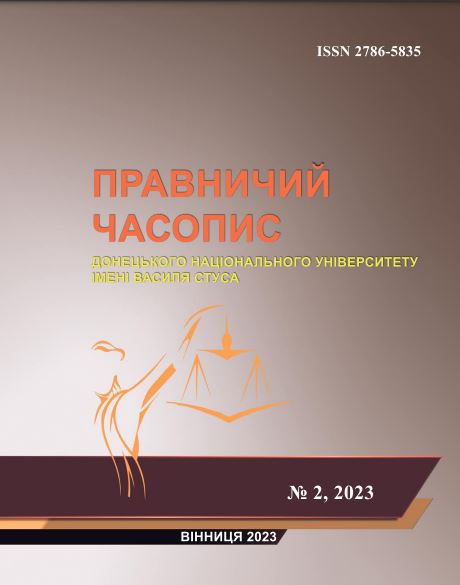The influence of religion on the development of criminal law institutions in Ukraine during the Early Middle Ages
DOI:
https://doi.org/10.31558/2786-5835.2023.2.4Keywords:
Ukraine; Ukrainian criminal law; development; religion; concept of crime; types of crimes; institution of punishment; purpose of punishment; public punishment; Middle Ages; sources of lawAbstract
The article is devoted to the study of the influence of religious norms on the evolution of criminal law institutions in Ukraine during the Early Middle Ages.
The author emphasizes that during the days of Kyivan Rus’ there was no distinction between the concepts of «crime» and «civil-law delict», so the crime was understood as «obraza», i. e. the 38 task of physical, material or moral damage in all kinds of manifestations. The concept of a criminal offense contained both formal and material elements. With the adoption of Christianity, such groups of crimes as crimes against the family and morals (fornication, rape, adultery, drunkenness, voluntary divorce, marriage between close relatives, polygamy, birth of a child out of wedlock, as well as various sexual perversions) became known to the national criminal law and crimes against faith and the church, the object of which was the church, its property rights, religious instructions and prescriptions. However, the volume of reception of Byzantine law during the existence of Kyivan Rus was insignificant. The most important monuments of church law were the Statutes on Church Courts of Princes Volodymyr Svyatoslavovych and Yaroslav the Wise.
The author focuses attention on the fact that the state and law undoubtedly have their traditional religious basis. Therefore, the integration of the traditions of paganism and Christianity, which began at the end of the 10th century, had a positive effect on the development of institutions of national law, especially criminal law. The Christian Church in Ukraine developed its own system of punishments, which differed significantly from the punishments applicable in Byzantium or Medieval Europe. In the studied period, the church did not use the inquisitorial process of investigation in the Ukrainian lands. Therefore, Christianity, borrowed from Byzantium, became not Byzantine, but exclusively Ukrainian. Ecclesiastical law was forced to adapt to the conditions of a stable social environment.
The author comes to the conclusion that the high spiritual level of the Ukrainian people contributed to the fact that the concepts of freedom and humanity, goodness and justice, democracy and dignity were established throughout history. These principles in the pre-Christian era began to be reflected in the norms of customary law, and with the adoption of Christianity they became the basis of the legal system.
References
Ткачук І. Д. Формування українського законодавства на засадах християнського вчення. Філософські та методологічні проблеми права. 2016. № 2(12). С. 90–101.
Громовчук М. В., Бєлов Д. М. Релігія та право: співвідношення в умовах війни. Науковий вісник Ужгородського Національного Університету. Серія Право. 2022. Випуск 71. С. 55-64. URL: 10.24144/2307-3322.2022.71.8
Кудін С. В. Форми існування кримінального права України у Х – першій половині ХVІІ ст. Вісник Академії праці і соціальних відносин Федерації профспілок України. 2002. № 4. С. 70–75.
Биков О. М. Особливості нормативно-правового регулювання релігійних відносин у період християнізації Київської Русі. Держава та регіони. Серія: Право. 2011. № 1. С. 5–8.
Пайда Ю. Ю. Християнський закон і звичаєва правосвідомість як чинники соціальної регуляції у Київській Русі. Правничий часопис Донбасу. 2018. № 4(65). С. 76–82.
Российское законодательство Х–ХХ веков:в девяти томах/под ред. О. И. Чистякова. Москва: Юридическая литература, 1984. Т. 1. Законодательство Древней Руси. 1984. 432 с.
Мартинюк О. В. Еволюція правового становища жінки в Україні (Х – перша половина ХVІІ ст.): дис. ... канд. юрид. наук: 12.00.01; Київський національний університет внутрішніх справ. Київ, 2010. 219 с.
Исторія русскаго права по лекціямъ П. Н. Мрочекъ-Дроздовскаго. Москва: Типографія В. А. Гатцукъ, 1892. 314 с.
Щапов Я. Н. Брак и семья в Древней Руси. Вопросы истории. 1970. № 10. С. 216–220.
Мартинюк О. В. Порядок та умови взяття шлюбу в Україні (Х – перша половина ХVІІ ст.). Держава і право: зб. наук. праць. Юри¬дичні і політичні науки. 2004. Вип. 23. С. 106–111.
Мартинюк О. В. Права жінки як об’єкт злочинних посягань в Україні (Х – перша половина ХІV ст.). Вісник Академії праці і соціальних відносин Федерації профспілок України. 2004. № 4. С. 55–61.
Історія українського права: Матеріали до курсу лекцій з історії української державності. навчальний посібник: за ред. О. О. Шевченка. Київ: Олан, 2001. 214 с.
Коломінський Н. Л., Льовочкіна А. М. Етнопсихологія українців. Україна на зламі тисячоліть: історичний екскурс, проблеми, тенденції та перспективи: кол. моногр. за заг. ред. Г. В. Щокіна, М. Ф. Головатого. Київ: МАУП, 2000. С. 59–76.

